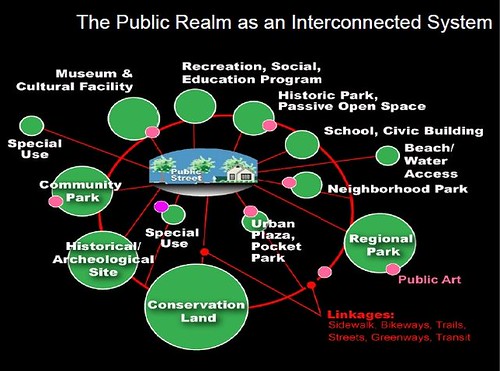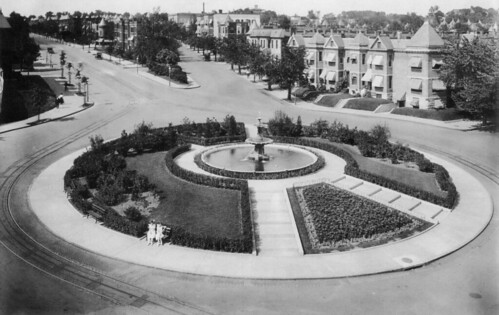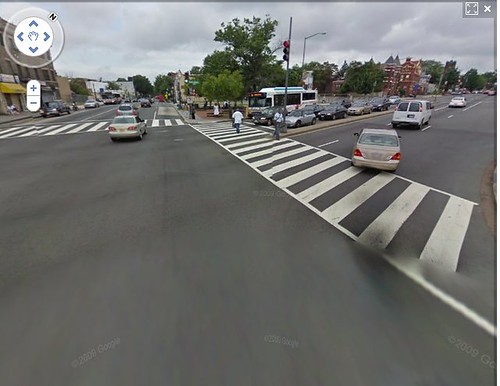So I just woke up from a dream/nightmare where I somehow became an at-large City Councilmember through appointment and I had to share an office with Vincent Orange (in DC, Councilmembers have their own individual offices, as do councilmembers in most places).
I wouldn't agree to something he wanted me to do, but I was interested in his tracking of China issues and taste in music--in real life, I know nothing about Vincent Orange on these dimensions.
Not to mention articles about the embarrassment of DC officials going to states like New Hampshire ("
New Hampshire gives DC the cold shoulder on statehood push") and Florida to lobby for statehood and full voting rights. Yes, DC residents should have full voting rights. But like it or not, the states had to meet certain qualifications in order to be admitted to the Union as full-fledged states, and these days, I don't think DC is putting forward a very strong case.
Now while I thought about what my agenda would be to run for office, I also started getting scared in terms of figuring out how to get campaign petitions out and circulated and the right number of signatures, fundraising for a campaign (I ran for City Council in Ann Arbor in 1987 and I hated fundraising back then...), and the creation of an organization able to get out the vote in all the wards and precincts, do campaigning in the interim, and have people at all the polls on election day.
Thinking about that stuff is why I probably can't get back to sleep...
But enough of retail politics, what would my agenda be, and conversely what should the agenda be for candidates for office who want to change the way the city is being governed now?
Sustainable Communities slide from presentation, Leadership and the Role of Parks and Recreation in the New Economy, David Barth, AECOM.
Overall vision
Building the city for the future, where it can continue to grow, rather than strictly managing the city as if it is still shrinking in population and business and desperately needs to stabilize. I tend to believe that most elected officials have no real overall vision or sense of where the city should be focusing.
That means dealing with transportation, schools, and poverty reduction most of all.
Because DC collects 100% of the income tax of residents, attracting more residents with income should be a key goal. How to "insert" new residences in a city where much of the land is off-limits to development (federal land, university campuses, parks, etc.) is a conundrum.
And because commercial property generates a significant amount of the city's revenue base, maintaining the city's pre-eminence as a place to conduct commerce should be a key priority.
Public Realm as an Interconnected system, Slide from presentation, Leadership and the Role of Parks and Recreation in the New Economy, David Barth, AECOM.
Quality of life
The idea would be to extend Councilman Wells' "livable-walkable" (placemaking) agenda to the entire city. After all, I argue that the point of planning and zoning is to increase quality of life. When planning and zoning outcomes don't do so routinely, we know that the processes "need to be improved."
- develop a robust planning framework for DDOT and the Office of Planning to integrate placemaking initiatives in streetscape and other projects
- pursue ideas to rebuild places that have been sacrificed to roadway expansion, e.g., bringing back Truxton Circle or wide sidewalks on Connecticut Avenue in Cleveland Park, and creating new squares such as Dan Malouff's idea for "Scott Square" or the idea to "deck over" the underpasses on streets such as Connecticut Avenue in Dupont Circle or along North Capitol Street on the border of the Bloomingdale and Eckington neighborhoods (these and other similar initiatives have been discussed in past entries)
- develop a parks and recreation master plan that integrates federal parks into the planning mix, as well as schools
- development of better planning and zoning regulations such as big box retail zoning overlays and the imposition of development impact fees
- imposition of design guidelines and review procedures for the entire city, not just historic districts
Truxton Circle before (top) and after (bottom).
Economic development
• My #1 belief about DC's economic development capability and capacity is that transit improvement and extension should be the city's number one priority.
- Committing to and creating the separated blue line subway line would be a key priority, and further expansion planning for other subway lines within the city (e.g., Michael S's "brown line" idea or Dave Murphy's proposal for a separated yellow line)
- As would improvements in surface transportation, a streetcar system for DC, with connections to and service within Montgomery and Prince George's County as well, and improvements to the bus system.
- Funded in part by a transit withholding tax on all wage income earned in DC (Congress would have to sign off on this).
- Creation of an innovation agenda and research parks at Catholic University in Northeast DC and the St. Elizabeth's Campus in Southeast DC
- Creation of a better commercial district revitalization program, focused on enabling small business development, and limiting retail "greenfield" development within the city which often comes at the expense of extant places. (At the same time, not every commercial strip can be "fixed".)
Participatory Democracy
My interest in planning derives from the fact that land use issues are those issues most likely to engage the average citizen in local civic affairs, and I believe that planning functions to engage citizens in the process.
But DC suffers from being the "local" city where the federal government is based, and I joke that "big" government trickles down and shapes "little" (local, DC) government in its image.
- Create a civic engagement element in the Comprehensive Land Use Plan covering substantive participation requirements in city activities including planning and budgeting
- Note that the Comp. Plan is the closest the city has to a "master plan" or "business plan" and it should be retitled accordingly
Restructuring DC Government's political structure
For a long time I've suggested we need a charter revision commission. DC has had Home Rule for 30+ years, it's time for an evaluation. Of course, changes to the Home Rule Charter require Congressional approval.
- First, I'd add a Planning and Parks Commission and a Transportation Commission. (cf. "civic engagement.") The former would have oversight over all DC Government Agency planning activities. The Transpo Commission would oversee transportation, which is key, given that it is the foundation of DC's economic and competitive advantages.
- Second, I'd change the structure of City Council as I have argued before:
-- Make it a part-time job truly
-- Cut the salary in half (from about $130,000 now to about $70,000)
-- Add one Councilmember to each ward, and four more at large. That would create competition within wards rather than relatively impregnable power bases. It would make it harder to pass legislation (13 votes instead of 7), which would be a good thing.
-- likely more hearings would be at night, when average citizens are likely to be more able to attend
- Fifth, bring back the term limits that were passed in a referendum but overturned by City Council.
- Sixth, consider putting bonding initiatives up for citizen approval in elections.
- Seventh, see the discussion of participatory budgeting above.
Schools Reform
Schools reform in DC is so f*ed up that I think that the DC school system may be just about at the point of no return, except for the schools in the western portion of the city and Capitol Hill.
It's almost as if segregation has returned in that the public schools that function are in predominately white areas, while the schools in African-American neighborhoods have been supplanted by charter schools or are declining even more precipitously, given the constant turmoil of "reorganization" and "improvement" through a "practice of reform" that seems focused more on inducing chaos and turmoil.
As mentioned above, neighborhood schools are the basic building blocks of healthy vibrant sustainable neighborhoods and need to be maintained, not just as a school planning function, but as a land use and neighborhood stabilization and revitalization function.
- Focus efforts on the public schools, and begin reining in the charter schools, which are created without a broader plan for provision of schooling in the city.
- Build strong and deep professional development programs to support teachers, students, classrooms, families, principals, and schools.
- Extend the excellence that already exists in the school system, rather than quench it--expand cluster school programs such as in Capitol Hill, the Spanish language, and Montessori.
- Create cluster school programs in every ward (if needed) to strengthen and reposition the schools and programs.
- Consider developing year round school calendars, especially in high-poverty neighborhoods.
- Consider developing co-operative high school education programs, especially in high-poverty neighborhoods.
- Focus resources on significant reduction of achievement gaps between high-income and low-income students through the development of programs along the lines of those in Montgomery County, Maryland
- Note that I don't think that the schools should be under the Mayor and therefore the City Council. There should be a separate school board with oversight, but with checks and balances including Mayoral and Council oversight. Council has too many other responsibilities to give school issues the necessary heft and oversight required. (And we need a real plan for the schools, instead of various disconnected initiatives by Councilmembers.)
Health and Wellness
DC actually is a national best practice practitioner for its program of community clinics. I'd extend these clinics more purposively towards an integrated community system for care, with a focus on prevention, wellness, and chronic disease management. ("
Disruptive innovation once again") These kinds of functions can be one of the elements of neighborhood hubs based at neighborhood schools.
Poverty Reduction
DC is a wealthy place. It's also a place with areas predominated by multi-generational poverty. One of the only things that 2010 Mayoral candidate Leo Alexander said that made sense is that every 10% reduction in poverty in the city saves $150 million, because we spend $1.5 billion (or more) annually on social welfare related programs.
Another thought is to re-organize human services program delivery around assigning caseworkers to serve just a handful of families, focused on multiprogram coordination of services designed to reintegrate families socially and economically into the market economy (capitalism isn't going away any time soon, so the best way to participate in American society is to be employed).
Public Safety
- Continue to focus resources using problem-oriented policing and data-driven methods.
- Reorganize the youth rehabilitation services function. Too many young adults under the supervision of the youth section of the criminal justice system continue to perpetrate crimes, get killed, etc.
-To refocus our approach to youth crime issues, adopt the "Boston model." See "
Straight Outta Boston" from
Mother Jones Magazine.
Now I'm finally tired, and should be able to get back to sleep.
 So I just woke up from a dream/nightmare where I somehow became an at-large City Councilmember through appointment and I had to share an office with Vincent Orange (in DC, Councilmembers have their own individual offices, as do councilmembers in most places).
So I just woke up from a dream/nightmare where I somehow became an at-large City Councilmember through appointment and I had to share an office with Vincent Orange (in DC, Councilmembers have their own individual offices, as do councilmembers in most places). 






0 Comments:
Post a Comment
<< Home